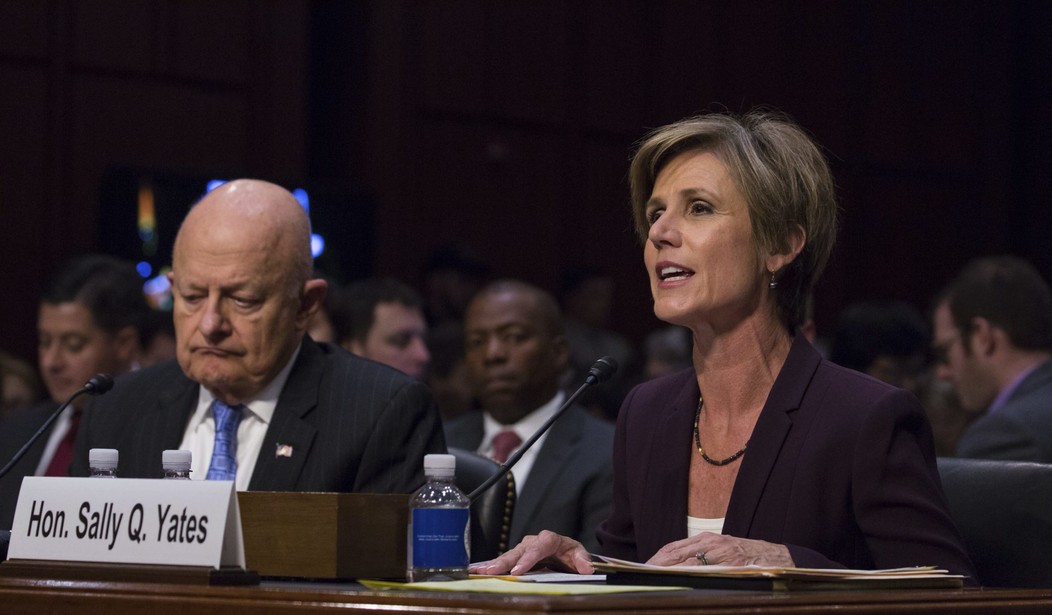WASHINGTON — Former Deputy Attorney General Sally Yates defended her decision to not defend the first iteration of President Trump’s travel ban that was halted in court, telling senators today that she first heard about the executive order via press reports and found the ban to be “unlawful” upon review.
Yates was testifying before the Senate Judiciary Subcommittee on Crime and Terrorism about Russian interference in the 2016 presidential election, but some GOP senators seized the opportunity to question her for the first time about the refusal to enforce the executive order that led to her Jan. 30 firing by Trump.
Yates said that the Office of Legal Counsel, which reviewed the executive order in consultation with the White House, “has a narrow function, and that is to look at the face of an executive order and to determine purely on its face whether there is some set of circumstances under which at least some part of the executive order may be lawful.”
“And importantly, they do not look beyond the face of the executive order, for example, statement that are made contemporaneously or prior to the execution of the E.O. that may bear on its intent and purpose,” she said. “That office does not look at those factors, and in determining the constitutionality of this executive order, that was an important analysis to engage in and one that I did.”
Senate Majority Whip John Cornyn (R-Texas), the first on the subcommittee to raise the issue with Yates, argued that the Justice Department has “a longstanding tradition of defending a presidential action in court if there are reasonable arguments in its favor, regardless whether those arguments might prove to be ultimately persuasive, which of course is up to the courts to decide and not you.”
“It is correct that oftentimes, but not always, the civil division of the Department of Justice will defend an action of the president or an action of Congress if there is a reasonable argument to be made,” Yates replied. “But in this instance, all arguments have to be based on truth because we’re the Department of Justice. We’re not just a law firm, we’re the Department of Justice… in this instance, in looking at what the intent was of the executive order, which was derived in part from an analysis of facts outside the face of the order, that is part of what led to our conclusion that it was not lawful.”
Cornyn slammed her for having “a distinguished career” over 27 years at the DOJ that ended with the “enormously disappointing” decision to counter Trump’s order “because you happen to disagree with it as a policy matter.”
Yates reminded Cornyn of her 2015 confirmation hearing for the post of deputy attorney general, in which then-Sen. Jeff Sessions (R-Ala.) asked what she would do if the president gave her an unconstitutional order. “I looked at this, I made a determination that I believed that it was unlawful,” she said today. “I also thought that it was inconsistent with principles of the Department of Justice and I said no. And that’s what I promised you I would do and that’s what I did.”
Sen. Ted Cruz (R-Texas) read Yates the U.S. Code that states the president can suspend entry of a class of aliens if he believes admittance would be detrimental to the United States. Yates shot back with the Immigration and Nationality Act, “that says no person shall receive preference or be discriminated against an issuance of a visa because of race, nationality or place of birth, that I believe was promulgated after the statute that you just quoted — and that’s been part of the discussion with the courts, with respect to the INA, is whether this more specific statute trumps the first one that you just described.”
“But my concern was not an INA concern here,” she added. “It, rather, was a constitutional concern, whether or not this — the executive order here violated the Constitution, specifically with the establishment clause and equal protection and due process.”
Cruz fired back that her arguments were those of “partisan litigants” and asked if she was “aware of any instance in which the Department of Justice has formally approved the legality of a policy, and three days later, the attorney general has directed the department not to follow that policy, and to defy that policy.”
“I’m not,” Yates replied. “But I’m also not aware of a situation where the Office of Legal Counsel was advised not to tell the attorney general about it until after it was over.”
“I would note, that might be the case, if there’s reason to suspect partisanship,” Cruz retorted.
Sen. Amy Klobuchar (D-Minn.) noted that the Trump administration, after hitting a roadblock in court, eventually altered the order that Yates refused to implement. That second version of the travel ban is likewise stalled in court.
“And there were a number of important distinctions between travel ban one and travel ban two. At the time I had to make my decision for example, the executive order still applied to green card holders, lawful permanent residents and those who had visas,” Yates said.
“Look I understand that, you know people of good will and — who are good folks can make different decisions about this. I understand that,” she added. “But all I can say is that I did my job the best way I knew how. I looked at this E.O., I looked at the law, I talked with the folks at the Department of Justice, gathered them all to get their views and their input and I did my job.”
“…I was not convinced that it was constitutional. I believed that it was unconstitutional in the sense that there was no way in the world I could send folks in there to argue something that we didn’t believe to be the truth.”









Join the conversation as a VIP Member